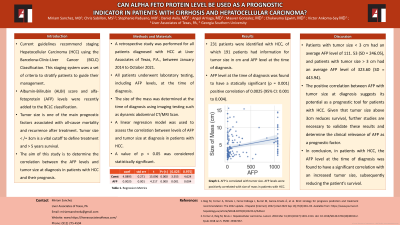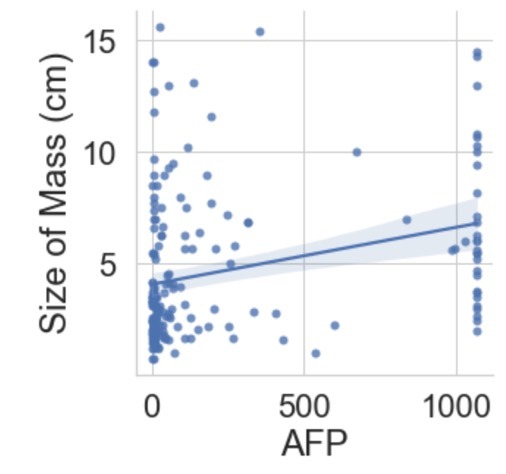Back


Poster Session D - Tuesday Morning
Category: Liver
D0478 - Can Alpha Feto Protein Level Be Used as a Prognostic Indicator in Patients With Cirrhosis and Hepatocellular Carcinoma?
Tuesday, October 25, 2022
10:00 AM – 12:00 PM ET
Location: Crown Ballroom

Has Audio

Miriam Sanchez, MD
Liver Associates of Texas, PA
Houston, TX
Presenting Author(s)
Miriam Sanchez, MD, Daniel Avila, MD, Chris Sabillon, MS, Stephanie Paduano, MD, Mayver Gonzalez, MD, Angel Arriaga, MD, Chukwuma Egwim, MD, Victor Ankoma-Sey, MD
Liver Associates of Texas, PA, Houston, TX
Introduction: Current guidelines recommend staging Hepatocellular Carcinoma (HCC) using the Barcelona-Clinic-Liver Cancer (BCLC) Classification. This staging system uses a set of criteria to stratify patients to guide their management. Albumin-Bilirubin (ALBI) score and alfa-fetoprotein (AFP) levels were recently added to the BCLC classification. Tumor size is one of the main prognostic factors associated with all-cause mortality and recurrence after treatment. Tumor size < /= 3cm is a vital cutoff to define treatment and > 5 years survival. The aim of this study is to determine the correlation between the AFP levels and tumor size at diagnosis in patients with HCC and their prognosis.
Methods: A retrospective study was performed for all patients diagnosed with HCC at Liver Associates of Texas, P.A., between January 2014 to October 2021. All patients underwent laboratory testing, including AFP levels, at the time of diagnosis. The size of the mass was determined at the time of diagnosis using imaging testing such as dynamic abdominal CT/MRI Scan. A linear regression model was used to assess the correlation between levels of AFP and tumor size at diagnosis in patients with HCC. A value of p < 0.05 was considered statistically significant.
Results: 231 patients were identified with HCC, of which 191 patients had information for tumor size in cm and AFP level at the time of diagnosis. The mean age was 67.8 years. The study included 191 deceased patients with an average period of survival after diagnosis of 37 months. There were 88 Caucasian, 50 Hispanic, 31 African American, 27 Asian, 4 Native American, and 31 unspecified. 72.3% were female. AFP level at the time of diagnosis was found to have a statically significant (p = 0.001) positive correlation of 0.0025 (95% CI: 0.001 to 0.004). For the cutoff value of tumor size > 3 cm, a two-sample t-test was executed and a significant difference was noted in AFP level between the two groups (p = 0.012). Patients with tumor size < 3 cm had an average AFP level of 111. 53 (SD = 246.05), and patients with tumor size > 3 cm had an average AFP level of 323.60 (SD = 443.94).
Discussion: The positive correlation between AFP with tumor size at diagnosis suggests its potential as a prognostic tool for patients with HCC. Given that there is a positive correlation between AFP with tumor size, and tumor size above > 3cm reduces survival, further studies are necessary to validate these results.

Disclosures:
Miriam Sanchez, MD, Daniel Avila, MD, Chris Sabillon, MS, Stephanie Paduano, MD, Mayver Gonzalez, MD, Angel Arriaga, MD, Chukwuma Egwim, MD, Victor Ankoma-Sey, MD. D0478 - Can Alpha Feto Protein Level Be Used as a Prognostic Indicator in Patients With Cirrhosis and Hepatocellular Carcinoma?, ACG 2022 Annual Scientific Meeting Abstracts. Charlotte, NC: American College of Gastroenterology.
Liver Associates of Texas, PA, Houston, TX
Introduction: Current guidelines recommend staging Hepatocellular Carcinoma (HCC) using the Barcelona-Clinic-Liver Cancer (BCLC) Classification. This staging system uses a set of criteria to stratify patients to guide their management. Albumin-Bilirubin (ALBI) score and alfa-fetoprotein (AFP) levels were recently added to the BCLC classification. Tumor size is one of the main prognostic factors associated with all-cause mortality and recurrence after treatment. Tumor size < /= 3cm is a vital cutoff to define treatment and > 5 years survival. The aim of this study is to determine the correlation between the AFP levels and tumor size at diagnosis in patients with HCC and their prognosis.
Methods: A retrospective study was performed for all patients diagnosed with HCC at Liver Associates of Texas, P.A., between January 2014 to October 2021. All patients underwent laboratory testing, including AFP levels, at the time of diagnosis. The size of the mass was determined at the time of diagnosis using imaging testing such as dynamic abdominal CT/MRI Scan. A linear regression model was used to assess the correlation between levels of AFP and tumor size at diagnosis in patients with HCC. A value of p < 0.05 was considered statistically significant.
Results: 231 patients were identified with HCC, of which 191 patients had information for tumor size in cm and AFP level at the time of diagnosis. The mean age was 67.8 years. The study included 191 deceased patients with an average period of survival after diagnosis of 37 months. There were 88 Caucasian, 50 Hispanic, 31 African American, 27 Asian, 4 Native American, and 31 unspecified. 72.3% were female. AFP level at the time of diagnosis was found to have a statically significant (p = 0.001) positive correlation of 0.0025 (95% CI: 0.001 to 0.004). For the cutoff value of tumor size > 3 cm, a two-sample t-test was executed and a significant difference was noted in AFP level between the two groups (p = 0.012). Patients with tumor size < 3 cm had an average AFP level of 111. 53 (SD = 246.05), and patients with tumor size > 3 cm had an average AFP level of 323.60 (SD = 443.94).
Discussion: The positive correlation between AFP with tumor size at diagnosis suggests its potential as a prognostic tool for patients with HCC. Given that there is a positive correlation between AFP with tumor size, and tumor size above > 3cm reduces survival, further studies are necessary to validate these results.

Figure: AFP is correlated with tumor size. AFP levels were
positively correlated with size of mass in patients with HCC.
positively correlated with size of mass in patients with HCC.
Disclosures:
Miriam Sanchez indicated no relevant financial relationships.
Daniel Avila indicated no relevant financial relationships.
Chris Sabillon indicated no relevant financial relationships.
Stephanie Paduano indicated no relevant financial relationships.
Mayver Gonzalez indicated no relevant financial relationships.
Angel Arriaga indicated no relevant financial relationships.
Chukwuma Egwim: Allergan Plc – Grant/Research Support. Genfit – Grant/Research Support. Gilead Sciences – Speaking & Teaching. Intercept Pharmaceuticals – Grant/Research Support. Madrigal Pharmaceuticals – Grant/Research Support. NorthSea Therapeutics – Grant/Research Support.
Victor Ankoma-Sey: Abbvie – Speaking & Teaching. Allergan Plc – Grant/Research Support. Genfit – Grant/Research Support. Gilead Sciences – Speaking & Teaching. Intercept Pharmaceuticals – Grant/Research Support. Intercept Pharmaceuticals – Grant/Research Support. Intercept Pharmaceuticals – Speaking & Teaching. Madrigal Pharmaceuticals – Grant/Research Support. NorthSea Therapeutics – Grant/Research Support.
Miriam Sanchez, MD, Daniel Avila, MD, Chris Sabillon, MS, Stephanie Paduano, MD, Mayver Gonzalez, MD, Angel Arriaga, MD, Chukwuma Egwim, MD, Victor Ankoma-Sey, MD. D0478 - Can Alpha Feto Protein Level Be Used as a Prognostic Indicator in Patients With Cirrhosis and Hepatocellular Carcinoma?, ACG 2022 Annual Scientific Meeting Abstracts. Charlotte, NC: American College of Gastroenterology.
